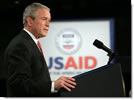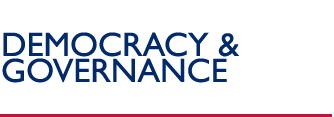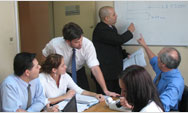Promoting Democracy and Good Governance
Today the world is a much smaller place, and its problems confront us in more immediate ways. The United States is vigorously engaged in all corners of the globe, acting as a force for peace and prosperity. Expanding the global community of democracies is a key objective of U.S. foreign policy.
USAID Hosts President Bush to Discuss the Freedom Agenda
 On July 24, Henrietta H. Fore, Administrator of the U.S. Agency for International Development (USAID), welcomed President George W. Bush to USAID’s headquarters. In his address to leading democracy and governance stakeholders, the President discussed progress on the Freedom Agenda to end tyranny and he honored activists in “captive nations” for their work fighting for freedom and democracy around the world. On July 24, Henrietta H. Fore, Administrator of the U.S. Agency for International Development (USAID), welcomed President George W. Bush to USAID’s headquarters. In his address to leading democracy and governance stakeholders, the President discussed progress on the Freedom Agenda to end tyranny and he honored activists in “captive nations” for their work fighting for freedom and democracy around the world.
 View the President’s remarks View the President’s remarks
For more information, view "Advancing the Freedom Agenda" Fact Sheet
Democracy & the U.S. National Interest
As the primary channel for U.S. foreign assistance in the developing world, USAID has taken a leading role in promoting and consolidating democracy worldwide. Expanding democracy improves individual opportunity for prosperity and improved well-being, thus contributing to the more traditional goals of the Agency.
The strategic long-term domestic and foreign policy objectives of the United States are best served by enlarging the community of democratic nations worldwide. Establishing democratic institutions, free and open markets, an informed and educated populace, a vibrant civil society, and a relationship between state and society that encourages pluralism, participation, and peaceful conflict resolution -- all of these contribute to the goal of establishing sustainable democracies.
USAID Democracy & Governance Goals
The Agency focuses its efforts to promote democracy and good governance on four distinct, but related, goals:
Progress in all four areas is necessary to achieve sustainable democracy.
USAID Definition of Democracy Programs
Democracy and governance programs are technical assistance and other support to strengthen capacity of reform-minded governments, non-governmental actors, and/or citizens in order to develop and support democratic states and institutions that are responsive and accountable to citizens. These efforts also include promoting democratic transitions in countries that are not reform-minded. Democracy programs promote the rule of law and human rights, transparent and fair elections coupled with a competitive political process, a free and independent media, stronger civil society and greater citizen participation in government, and governance structures that are efficient, responsive and accountable.
Initiatives to Improve Evaluation of USAID DG Assistance Programs: Strategic and Operational Research Agenda (SORA)
The Strategic and Operational Research Agenda (SORA) is a comprehensive long-term effort being undertaken by the Bureau for Democracy, Conflict and Humanitarian Assistance, Office of Democracy and Governance (DCHA/DG) to measure the impact and effectiveness of USAID democracy and governance assistance programs. Under the SORA initiative, DCHA/DG supported two major research efforts, including a cross-national study of the impact of USAID DG assistance conducted by researchers at Vanderbilt University and the University of Pittsburgh, and a report by the National Research Council of the National Academy of Sciences with recommendations for improving DG evaluations.
 Find out more about these initiatives Find out more about these initiatives
Back to Top ^
|


